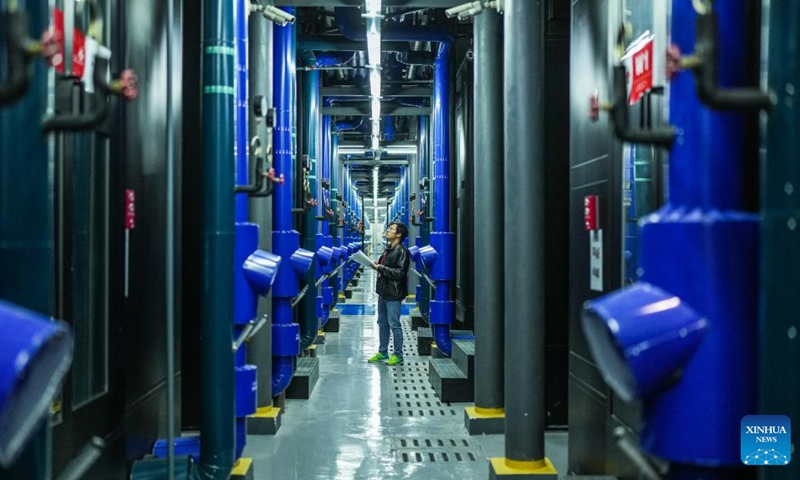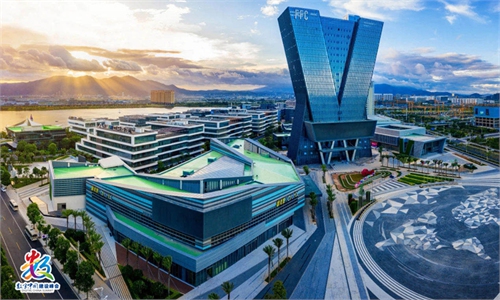
A staff member inspects the operating status of the micro module room in Guian Data Center of China Unicom in Guian New Area, southwest China's Guizhou Province, on May 23, 2023. Photo: Xinhua
Additional efforts will be made to strengthen research and development in key products, such as CPUs, GPUs, and servers. Computing innovation will also be strengthened, an official from China's Ministry of Industry and Information Technology (MIIT) announced at a press conference on Monday.These efforts aim to enhance self-innovation capabilities in core technologies, the official said.
Experts view this move as a necessary response to the increased technology blockage by the US, including the cloud computing service sector. Strengthening domestic technological innovation capabilities is seen as a crucial step to ensure the security of the industrial chain.
During the press conference for 2023 China Computing Power Conference, Xie Cun, the director-general of the Information and Communication Development Department of the MIIT, called for strengthening technological innovation, including enhancing innovation capabilities, the driving advancements in computing architecture, computing methods, and algorithms.
"This involves intensifying research and development efforts for key products like CPUs, GPUs, and servers, as well as accelerating the implementation of the corresponding new technologies and products," said Xie.
The construction of the computing-related hardware and software ecosystem was addressed as a crucial aspect for the innovation. It requires strengthening the coordination between hardware and foundational software to foster a collaborative and thriving ecosystem across the industry chain.
The remarks came amid the US escalating threats of imposing sanctions to restrict Chinese companies' access to US cloud computing services as media reported, expanding its restrictions from hardware to software services.
These actions are strategically aimed at undermining China's overall computing capabilities, Ma Jihua, an industry veteran analyst, told the Global Times on Monday.
To overcome the current situation, Ma emphasized the importance of not only addressing challenges in developing end-user devices but also fundamentally tackling computing power issues. "Computing power is crucial for developing new-generation technologies, including models like ChatGPT."
Previously, the focus was on addressing specific bottlenecks in an ad hoc manner. However, there is now recognition that a comprehensive solution is needed, covering hardware and software from manufacturing to design, and from operation to maintenance.
According to a joint report by KPMG China and Lenovo Group at the recent 2023 World Artificial Intelligence Conference, China has laid a foundation for a continuously improving industrial chain. The report highlighted active innovation, rapid market growth, and increasing international competitiveness in the field of computing power.
Preliminary estimates suggest that by 2025, China's core computing power industry will reach a scale of no less than 4.4 trillion yuan ($613 billion), positioning it as a high-potential sector comparable to new energy vehicles. If related industries are included, the scale could reach 24 trillion yuan.
The recently-released Global Computing Index 2022-2023 confirms that the US and China maintain the top two positions in national computing index rankings, establishing themselves as frontrunners in the field.
In recent years, the MIIT has issued various policy documents, including the plan for the development of the country's information and communications industry during the 14th Five-Year Plan (2021-2025). These policies comprehensively promote the construction and application of computing power infrastructure.
"The intensified emphasis at the governmental level, coupled with the implementation of these measures, has provided robust policy support to drive the development of computing power infrastructure," Ma noted.



